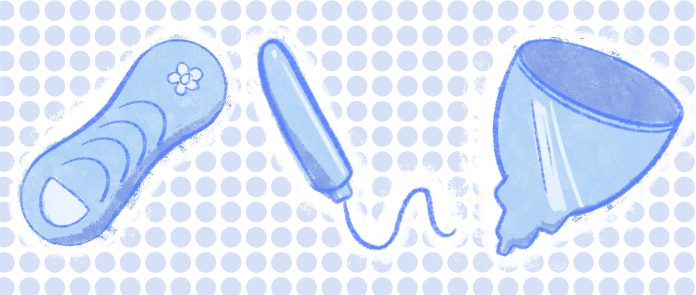Natalie Aymond
Staff Writer
This Feb. 8-11, the Office of the External Vice President for Statewide Affairs office (EVPSA) handed out free menstrual products in front of the Arbor in an effort to promote menstrual equity. The Bottom Line sat down with Esmeralda Quintero-Cubillan, the current external vice president for statewide affairs, and discussed what #MenstrualEquity4All means for our community and what efforts are being made to get closer to reaching it.
The EVPSA office works to encourage and inform UC Santa Barbara (UCSB) students about different ways to advocate for change in their community and establish representation at a statewide and national level.
This year, at the UC Student Organizing Summit, where the UC students decide on their priorities for the year, the EVPSA office and the UC Student Association elected menstrual equity as a campaign goal. This consists of promoting student success through holistic approaches — not just affordability issues, but also issues regarding how well a menstruating student can thrive on UC campuses.
The menstrual equity event at the Arbor was the idea of the EVPSA Organizer, Marvia Cunanan. This idea was informed by data expressing how menstruating students can experience certain suffering in a school setting. For example, menstruating students are more likely to miss class or leave class early to have to find proper products that are not always readily available.
At UCSB, some resources on campus also tend to these similar issues and provide students with some free or discounted menstrual products, such as the Women’s Center and the Health and Wellness Center.
Quintero-Cubillan noted that the event was, in part, about students taking action to ensure adequate access to menstrual products for all students by holding the UC system accountable for not already providing these resources at a UC-wide level.
“The underlying goal is that no menstruating student should have to suffer their attempt to pursue higher education, or really just their ability to participate in our community because of menstruating,” the EVPSA added.
During this event, the EVPSA was able to hand out 600 days worth of menstrual hygiene products. These products not only included tampons and pads, but also panty liners, heating pads, and informational pamphlets (zines) on how to use menstrual hygiene cups. Additionally, several reusable and environmentally-friendly menstruation cups and menstrual hygiene panties were raffled off.
In their efforts to promote inclusivity, the EVPSA office also handed out condoms, candy, and personal safety alarms with their own flashlights for non-menstruating persons.
With such a diverse array of free products available to students, this event was aimed to fall in line with the EVPSA’s holistic approach. Their goal was to recognize how not all student needs are the same when it comes to menstruating and that not every menstruating person is necessarily educated on how to use all these products successfully.
In addition to handing out large numbers of free products, the EVPSA discussed the reaction they received from the student community and its response to this menstrual equity event. While they expected participation from menstruating individuals, Quintero-Cubillan was also shocked to see the event receiving positive attention, receptiveness, and appreciation from the non-menstruating community.
Quintero-Cubillan also mentioned how part of this receptiveness reaffirmed the dialogue that they were advocating for, in which menstrual equity should be a right and where there should be free products for students in 50 percent of all bathrooms on campuses.
“We need to not only consider gender equity, but also the way in which institutions,” Quinter-Cubillan emphasized, “whether it be the UC or literally just the nation and state, do their part in eliminating systemic barriers, not just for women, but all menstruating people.”
In terms of what else the EVPSA office is doing with this issue, they hope to use their advocacy budget to pursue petition efforts to eliminate the pink tax. They also hope to further conversations on menstrual equity that go beyond just the availability of products, but also touch on how to uplift all menstruating students within the UC system.
Accompanying their event in front of the Arbor, the EVPSA office also has a testimonial available online, giving students a platform to share their experiences and add to a growing community of those fighting for menstrual equity.
Quintero-Cubillan remarked that this event, in its entirety, was a great way for the EVPSA to use its position and resources to reach marginalized identities within the UCSB community and provide them with tangible help. Additionally, the conversation surrounding what it means to be a menstruating student on campus hopefully will continue to apply pressure on the UC system to be in touch and proactive with these issues.












Love seeing the promotion of positive change on our campus receiving such a good response from students. Great article and great movement.
Comments are closed.